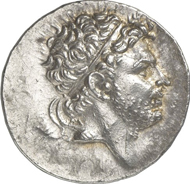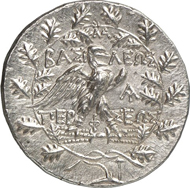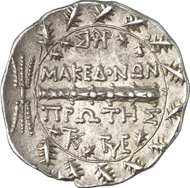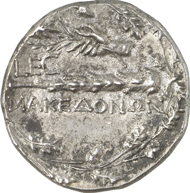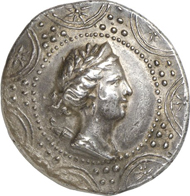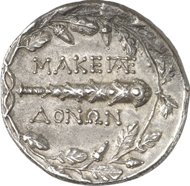In the summer of 168, Perseus, the last Macedonian king, gave up in the face of the strike capability of the Romans. In order to spare his nation’s blood, he went into captivity himself. It didn’t take long for the Macedonians to long for the old royal dominion again, though.
In the summer of 168, Perseus, the last Macedonian king, gave up in the face of the strike capability of the Romans.
Perseus. Tetradrachm, 170-168. Extremely fine. Estimate: 1.250 euro.
In order to spare his nation’s blood, he went into captivity himself. It didn’t take long for the Macedonians to long for the old royal dominion again, though.
The Romans had hesitated to assume direct administration of that vast and rich territory. Otherwise, individual Roman nobles would have gained such great a power that the carefully balanced equilibrium at home would have been jeopardized. Instead, the defeated ones were forced to accept a Republican constitution. 100 talents, i.e. exactly half of the hitherto royal taxes, had to be paid directly to Rome. Quite soon, however, the country’s economic activity diminished to such an extent, that the Macedonians had real problems to raise even that sum.
Macedonia. First district. Tetradrachm, 158-150. Extremely fine. Estimate: 250 euro.
The Romans had divided Macedonia into four districts that weren’t allowed to maintain any economical (and, for that matter, social) relations. The most important source of income, the gold and silver mines, were forced to close down for ten years. Importation of salt was prohibited. That wasn’t just a culinary nuisance but also meant that an important way of curing food was no longer available. Naturally, lumber for ships could no longer be felled to the effect that the Macedonians could no longer build ships, be it war ships or trade ships.
Macedonia. Second district. Tetradrachm, 158-150. Good very fine. Estimate: 3,000 euro.
The Macedonians were only allowed to keep border troops which would serve as bulwark against the assailing nomadic tribes from the north – that really was an important task for Greece. While these troops used to have been financed by royal revenues, the economically weakened country had to bear any costs for defense and infrastructure in addition now. In contrast to the Romans, who had gained such profit out of the Macedonian royal treasure that they were able to mostly dispense the Roman citizens from direct taxation from that moment on, the once so wealthy Macedonia descended into poverty, slowly but surely.
The time was ripe for an upheaval. The catalyst was a man called Andriskos. We don’t know much about him. His enemies supposed he was an adventurer from Adramytteion in the Troad. He, in contrast, claimed to be the son of Perseus and Laodike, hence rightful heir to kingship. Apparently, Andriskos had turned to his uncle Demetrios I of Syria for help, only to be turned in to the Romans by him. How Andriskos managed to escape from Roman prison we don’t know – in any case, he resorted to the peoples in the north. Aided by Thracian troops, he conquered major parts of Macedonia and even gained a great victory over a small army of the Romans. But when the senate sent Q. Caecilius Metellus and his army to Macedonia, Andriskos didn’t stand a chance. The decisive battle was fought in 148. The Thracians were defeated, Andriskos taken hostage and dragged along in Metellus’ triumph only to be killed afterwards.
Macedonia. Issue of military government. Tetradrachm, 148/7, Amphipolis. Extremely fine. Estimate: 3,000 euro.
What followed next was a military government. Everything had to be rearranged. The former system – and apparently the Romans did see that quite clearly – was jointly responsible for the readiness of the Macedonians to support Andriskos. Their loyalty couldn’t be enforced, though, not even by more severe punishments.
The Roman administration pretended the Andriskos affair to be a mere external matter. Not the discontent in the country but the evil neighbors in the north were the alleged reason. The senate, nevertheless, initiated an administrative reform by sending a Roman governor into the province and charging Roman troops with securing the border.
Makedonia as Roman province. Tetradrachm, 147, Amphipolis. Extremely fine. Estimate: 5,000 euro.
Such a drastic measure was nothing extraordinary in those years. The Romans began to actively interfere in the Mediterranean region. They suspected (with good reason) resistance against their rule at many places. One year later, they destroyed Corinth, because the Achaean League wasn’t willing to partially dissolute. In the same year Carthage fell, for equally egoistic reasons. The Macedonians, however, apparently accepted their fate. At least, Rome offered protection against Thracians and Celts. As a result, Macedonia became a thriving province again. Macedonia connected the west with the east, Italy with Asia Minor. Thanks to its interurban road, it became a historical focal point that witnessed many events which changed the course of world history.
The complete catalogue is available here.




